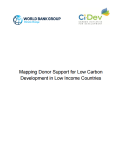
This report is prepared in response to a request by the participants of the Carbon Initiative for Development (Ci-Dev) for a desktop study describing donor activities in Low Income Countries (LICs) in Africa and Asia that have elements in common with the Ci-Dev Methodology Work Program (MWP). The scope of the research was broadened during implementation to allow for a review of initiatives that had similarities related to the entire Ci-Dev work program including business models. The intent of broadening the scope was to enhance the value of the report in assisting the CiDev work plan implementation by identifying opportunities to utilize potential synergies and avoid duplication with existing donor activities.
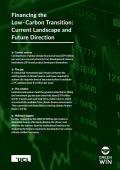
Existing flows of global climate finance (at least $391 billion per year) are sourced primarily from Development Finance Institutions (DFIs) and project developers themselves. A substantial ‘investment gap’ remains between the existing levels of climate finance, and those required to achieve the requisite level of decarbonisation to maintain a 2°C pathway (over $1 trillion per year). Institutional investors hold the greatest potential for filling the investment gap because they hold about $93 trillion worth of assets and seek long- term, stable returns, which are potentially available for climate finance investments. They currently contribute little to existing climate finance flows (~0.2%). Further research by the GREEN-WIN project seeks to determine how to effectively develop the drivers and alleviate the barriers faced by institutional investors for deploying the finance required to develop the low-carbon, climate-resilient economy.
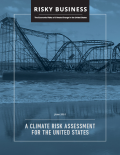
A Climate Risk Assessment for the United States identifies the economic risks posed by a changing climate. The U.S. will likely face the effects of human-induced climate change including rising seas and more frequent bouts of extreme heat. The report identifies striking economic impacts from climate change, from the near-term to the end of the century across all 50 U.S. states.
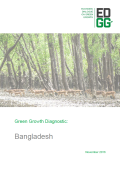
This report seeks to generate evidence on the binding constraints to shifting Bangladesh’s current economic strategy to one aiming at green growth. Specifically, it is critical that Bangladesh decouples its economy from the negative environmental effects of the economic growth path it is currently pursuing. It is important that green growth is pursued in order to unlock Bangladesh from its unsustainable growth path to a more sustainable and inclusive one.
This paper uses a novel approach which has not been trialled elsewhere- the Green Growth Diagnostic. This methodology will help Bangladesh develop its strategy to pursue an economic growth path that takes full account of natural resources and promotes sustainable development. This report will demonstrate and highlight the constraints that need to be addressed in order to do so.
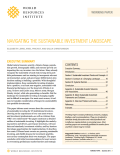
A new paper by World Resources Institute finds strong interest and opportunities for sustainable investing within the US institutional investor marketplace. But key barriers persist.
